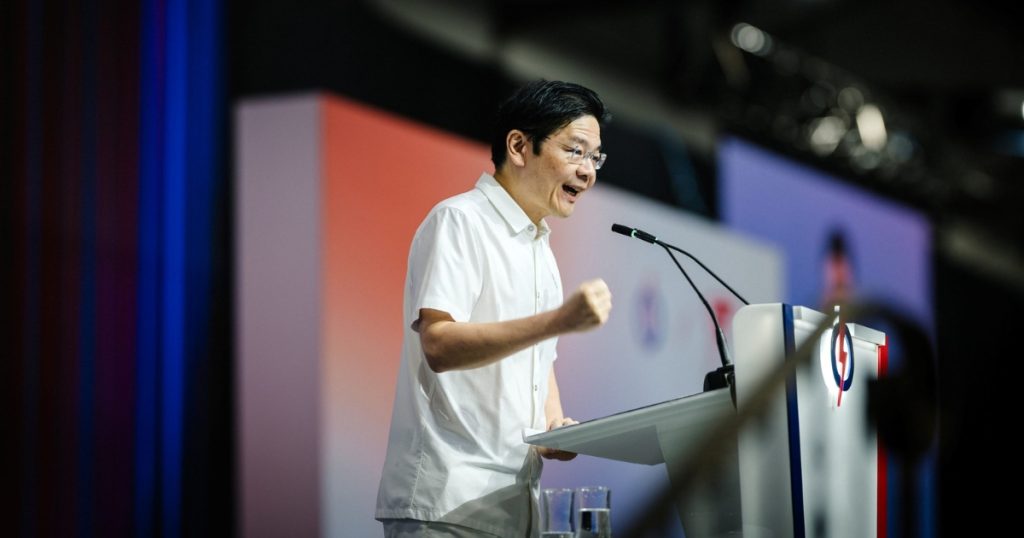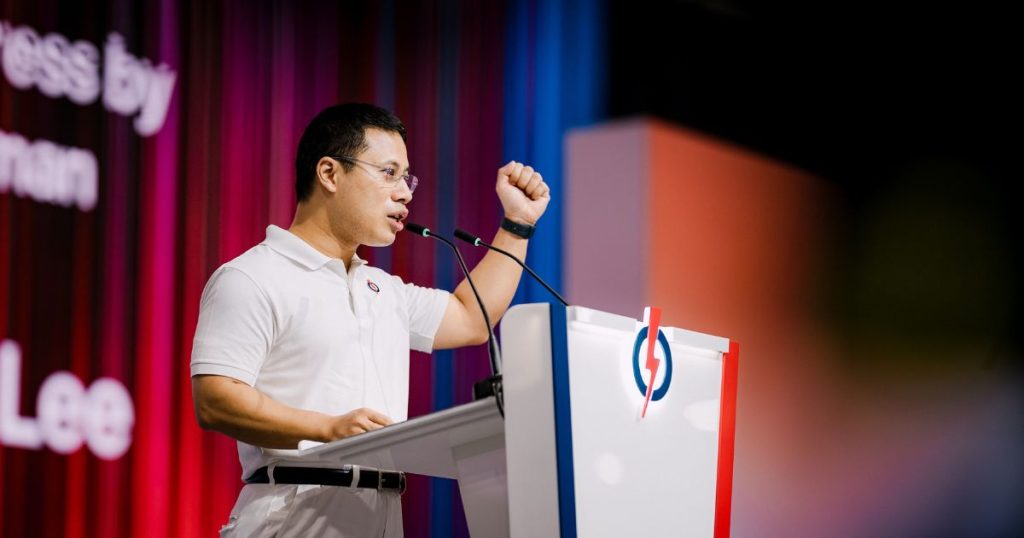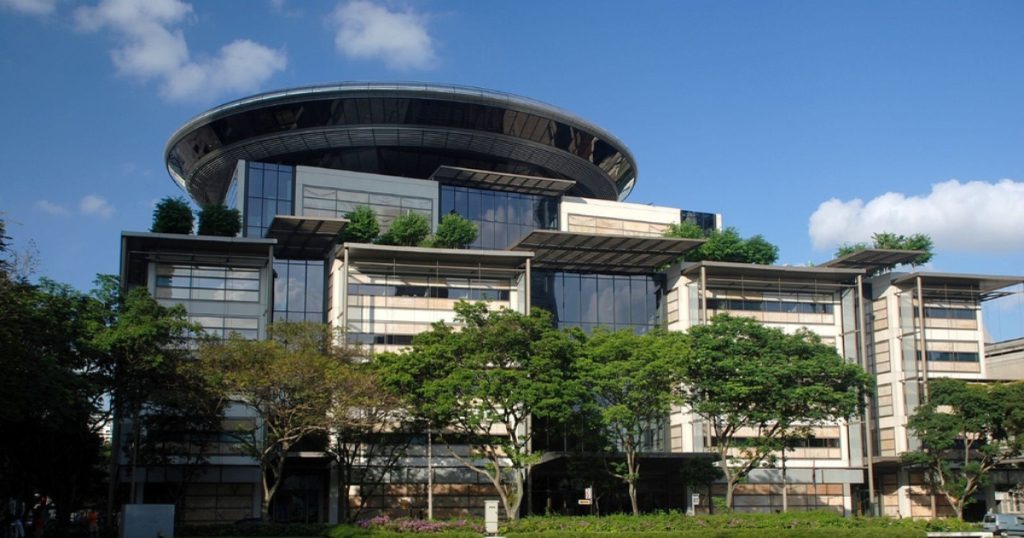Deputy Prime Minister Heng Swee Keat called on Workers’ Party (WP) Members of Parliament (MPs) to “play a constructive role” to improve the take-up rate of the SkillsFuture scheme.
During the second day of the Budget debate, Mr Heng engaged in a back-and-forth exchange with Gerald Giam (Aljunied GRC) and Associate Professor Jamus Lim (Sengkang GRC) of WP. The two MPs had criticised the national skills upgrading scheme without offering any practical solutions.
Their questions came after Mr Heng delivered a speech about the government’s efforts to grow the economy. He is also Coordinating Minister for Economic Policies.
Assoc Prof Lim asked how the Government can improve the scheme’s take-up rates and achieve its objectives of reskilling. He also alluded to the “continued scepticism” among workers of the benefits of the scheme.
“Name me a country which has started such an extensive SkillsFuture framework. Name me a country… when our students have done so well, and when our older workers are now working hard to learn new skills. Name me a country where the National Trades Union Congress is not only accepting change, but embracing change, be a partner for change… working with companies to do not just training, but operations and technology road mapping,” DPM Heng said.
According to Mr Heng, NTUC staff were trained by researchers from Agency for Science, Technology and Research (A*STAR) to look at how companies could adopt technology and redesign jobs for workers.
“Instead of saying that, ‘Oh no, I am sceptical, I am pessimistic’… play a constructive role – because with your professorship, you will know this well, right? Play a constructive role, be part of the team,” said Mr Heng.
Assoc Prof Lim said that he and his party colleagues would be happy to participate in further discussions with the various ministries if invited to do so.
Mr Heng said, “You don’t need an invitation. You are free to provide your suggestions. After all, aren’t you from the Workers’ Party?”
Mr Heng said the Ministry of Education and Ministry of Manpower would be happy to consider any “specific, good suggestions” on how to expand use of the credits.
Earlier, Mr Giam asked Mr Heng if it would be useful to expand the use of SkillsFuture credits to not just subsidised courses.
Mr Heng said there is a wide range of courses available. While it is good that workers take ownership of their training, he noted they should work together with their companies for greater impact.
He stressed that what’s important is one’s willingness to learn regardless of where or how the learning is done.
“In short, it is really about an attitude towards learning. That we must inculcate this interest and passion to learn and learn throughout your life.”
DPM Heng: Singapore can continue to thrive if it continues to transform its economy, remain innovative, and foster greater connection and collaboration

Singapore can continue to thrive, DPM Heng said, if it restructures along three lines to drive growth.
Firstly, to sustain efforts to transform Singapore’s economy through shared ownership. Singapore’s collaborative approach to transformation is how it ensures that the opportunities and benefits from transformation can be shared by all, he added.
Secondly, Singapore must build a strong innovation ecosystem that enable high value and cutting-edge work to be done here.
Thirdly, Singapore must continue to foster greater connection and collaboration at all levels, and strengthen its standing as a trusted node for technology, innovation and enterprise.
“So, Singapore’s next bound of growth must be powered by an economy that is technology-intensive, innovation-driven and sustainability-focused and provide good jobs for our workers,” said Mr Heng.
Skills upgrading
Skills upgrading and support for workers continued to be the main topics of discussion today. Chair for GPC for Manpower Desmond Choo (Tampines GRC) highlighted the importance of helping young Singaporeans transit to an economy shaped by artificial intelligence and climate change.
He proposed that the Government lower the SkillsFuture credit eligibility down from the current 25 years old to empower more youth to upskill and reskill. He also called on the government to provide subsidised diplomas for those affected by AI and Green Transition.
Chair for GPC for Education Patrick Tay (Pioneer SMC) suggested extending the SkillsFuture credit top-ups of $4,000 to other vulnerable groups of Singaporeans such as the retrenched, unemployed and freelancers. He also asked the Government to consider extending the Career Conversion Programmes to cover more sectors and industries.
“The current offerings may not be extensive enough to fully realise the potential and capabilities of those keen to embark on a career change voluntarily or involuntarily.”
Rachel Ong (West Coast GRC) was concerned about people with disabilities not being given equal access to training and upskilling opportunities. She pointed out the obstacles PWDs face and proposed ways to help them. They include equipping adult educators with the knowledge and skills to develop accessible course materials, and providing information on course accessibility pre-enrolment.
Support for workers

On support for workers, Mr Tay said that the new temporary financial support scheme for involuntarily unemployed workers should cover beyond lower-wage workers.
Yeo Wan Ling (Pasir Ris-Punggol GRC) called for extra protection and representation for platform workers in their earnings, benefits, and welfare.
“More transparency must be given by the platforms. For platform workers wishing to transit out of platform work, we must also prep for their long-term career resilience with upskilling,” she added.
Separately, she asked the government to make essential trades like plumbing, electrical work, air-conditioning servicing and mechanical repairs “viable and exciting with visible and attainable career pathways to attract new talent”.
Support for SMEs
Support for local businesses is another area MPs touched on. Deputy Chair for GPC for Manpower Edward Chia (Holland-Bukit Timah GRC) said cash flow is a key area of concern for small medium enterprises (SMEs). He asked if the Government could consider shortening the period for reimbursements for the Progressive Wage Credit Scheme to help enterprises with their cash flows.
The government announced an additional $3 billion commitment to the $25 billion Research, Innovation and Enterprise 2025 (RIE2025) plan and over $1 billion investment in the next five years into AI.
Chong Kee Hiong (Bishan-Toa Payoh GRC) recommended that a portion of the two funds be set aside for SMEs or collaborations with SMEs. This is because incorporating AI development into their enterprises is not easy due to their smaller sizes and resource constraints.
“They need government support for funding and collaboration with researchers and universities, as well as partner companies upstream and downstream. Otherwise, the digital divide between SMEs and MNCs will become wider,” he added.
Don Wee (Chua Chu Kang GRC) proposed that more targeted funding support should be provided for SMEs to invest in solutions for carbon pricing and modelling, as well as projects involving management across the value-chain and decarbonisation efforts.
More housing options and enhancing liveability

Zhulkarnain Abdul Rahim (Chua Chu Kang GRC) supported the government’s move to help couples waiting for their BTO flats to defray part of their cost of renting HDB flats from the open market for a year with Parenthood Provisional Housing Scheme (PPHS) vouchers.
He asked if the Government would consider providing such vouchers at the outset for a period of two years. According to HDB, the average waiting time for a BTO flat is between three and four years. He explained that young couples with children can then sign longer tenancy agreements that “will provide greater stability in their living environment”.
Mr Zhulkarnain also called for the Government to improve lift access for residents staying in segmented blocks. Of the 150 segmented blocks in Singapore, 20 per cent of the blocks are found in Keat Hong which he oversees. He gave several suggestions such as the compulsory acquisition of such units for conversion to public rental housing, and chair lifts or ramps.
Price Kaki app will be enhanced
Consumers will soon enjoy an improved Price Kaki application that helps guide their purchases of everyday essentials.
President of the Consumers Association of Singapore (CASE) Melvin Yong (Radin Mas SMC) said that CASE will add a community feature to the Price Kaki app. This will allow users to share product reviews, in-store promotions, and tips to stretch their dollars. CASE would also recruit 2,000 grassroots volunteers across all constituencies as Price Kaki Champions. They will identify deals within their neighborhoods and teach others to use the app to find the best bargains.
“I am confident that we will further improve price transparency, promote cost-consciousness, and empower consumers to make better value-for-money purchase decisions,” he added.




